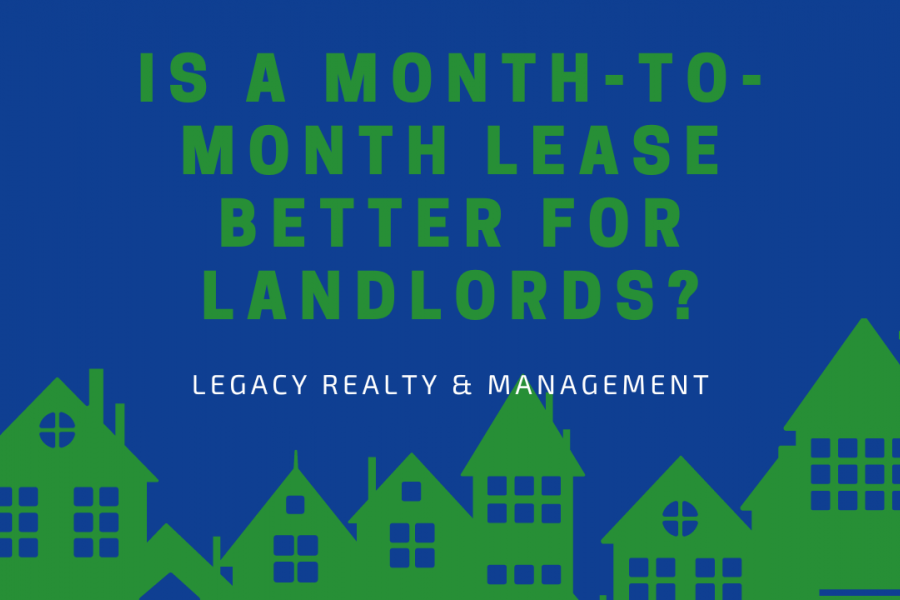
Real estate offers a variety of investment opportunities. Even if you decide to rent out your home, there are many different ways to go about it. Most landlords opt to find long-term tenants for their rentals. But another profitable option that has gained popularity in recent years is the month-to-month lease.
While it is not the norm, short-term leases can be highly beneficial. For instance, they offer more flexibility than a traditional lease agreement. They can also bring in higher cash revenue.
Determining whether a month-to-month lease is right for you requires careful consideration. To help you make an informed decision, the experts at Legacy Realty & Management have written this guide. Dive in to learn the pros and cons of month-to-month leases so you can decide if it's a good fit for you!
What Does a Month-to-Month Lease Entail?
A month-to-month lease is a flexible rental agreement that stipulates if a renter can live in a rental property for the span of just one month.
Unlike traditional fixed-term leases, short-term rental agreements renew automatically at the end of each month unless either party decided to terminate the lease with a written notice.
Month-to-month rental agreements are great for vacation rentals in vacation or furnished rentals. That is because renters looking for these kinds of properties typically only plan to stay for the short term, whether it is only a month or a semester.

Pros and Cons of a Month-to-Month Lease
Month-to-month leases have many advantages over long-term leases, like increased flexibility for both landlords and tenants.
However, they also come with challenges like uncertainty and a higher risk of holdover tenancies. Here are the pros and cons you should keep in mind to determine if a short-term rental agreement is right for you:
Benefits of Month-to-Month Leases
-
Higher rental income. With a month-to-month lease, you can price your rental property at a higher rate as short-term renters are often willing to pay more. This is also a protective measure against unexpected costs such as repairs. Plus, if you rent your home furnished, that can increase the cost of rent even more.
-
Increased flexibility. Short-term leases provide both landlords and tenants with unlimited flexibility. Homeowners can adjust rental terms without having to wait a year for the current lease to end. Additionally, both parties can end the rental agreement at any time as long as they give proper notice.
-
Reduced risk of holdover tenancies. A month-to-month lease can help you deal with holdover tenants more efficiently. As long as you have the paperwork to prove you ended the rental agreement, it’ll be easy to evict tenants who overstayed their welcome.

-
Fewer vacancies. With a short-term lease, tenants typically have to give 15 to 30 days’ non-renewal notice to their landlord. Knowing your tenants will be gone by the end of the month gives you time to start looking for a replacement immediately. With a good marketing strategy, you’ll find great renters in no time!
-
Ease of property sale. If you’ve been thinking of selling your rental property, a month-to-month lease is better for you. The flexible nature of this kind of lease allows you to make passive real estate income while listing and marketing your home for sale. But you’ll also have the security of knowing the lease can come to an end to make space for the new owners at any time.
-
Find quality tenants. Month-to-month leases can be used as a trial period whenever you have a new tenant. Before their lease is over, you can evaluate whether they are a good fit for your rental. If they’re not, you can simply choose not to renew their lease. This can save you a lot of time and money in the long run.
Cons of a Month-to-Month Lease
Just like any other kind of investment, renting your home for the short term comes with certain disadvantages, including:
- Income uncertainty. With short-term leases, tenants have the option to leave with just a month’s notice. This unpredictability makes it hard to maintain a steady cash flow or plan for the future, as your source of passive income is always at risk.

-
Highest turnover costs. A short-term rental can lead to an increase in tenant turnover. The accrued costs of cleaning, maintenance, and marketing efforts between tenancies can highly dip into your profits.
-
Higher potential for damage. All kinds of rental agreements pose a risk to your property. Even a tenant that looks great on paper, can damage your property or cause problems with neighbors. This can create additional administrative burdens and potentially impact the return on your investment.
-
Increased burnout. Managing a rental property can be exhausting. With a short-term lease, you’ll have to spend more time on tasks like advertising, maintenance, and tenant screening, which can be extremely time-consuming. This can cause you a lot of stress, especially as the end date of a lease comes closer.
In such cases, it’s best to consider hiring a seasoned property manager, such as Legacy Realty & Management. These professionals can help you with anything from advertising your rental to drafting a solid lease agreement to keep your investment protected.
Bottom Line
Short-term leases, just like traditional leases, are not one size fits all. Whether a month-to-month lease is better depends on each landlord’s individual circumstances, preferences, and investment goals.
A month-to-month lease can be highly beneficial. After all, it provides increased flexibility to both landlords and tenants, as well as the potential for higher rental income.
This option might not be the right fit, however, if you are looking for a stable source of income, as short-term rental agreements offer limited long-term stability. Now that you know the pros and cons of month-to-month leases, you can make an informed decision.
If you have more questions about month-to-month leases, contact Legacy Realty & Management today! With two decades of experience in the North Dallas Metro Area real estate market, we know what it takes for a rental business to succeed and can help you determine whether a short-term lease is a good fit for you.
